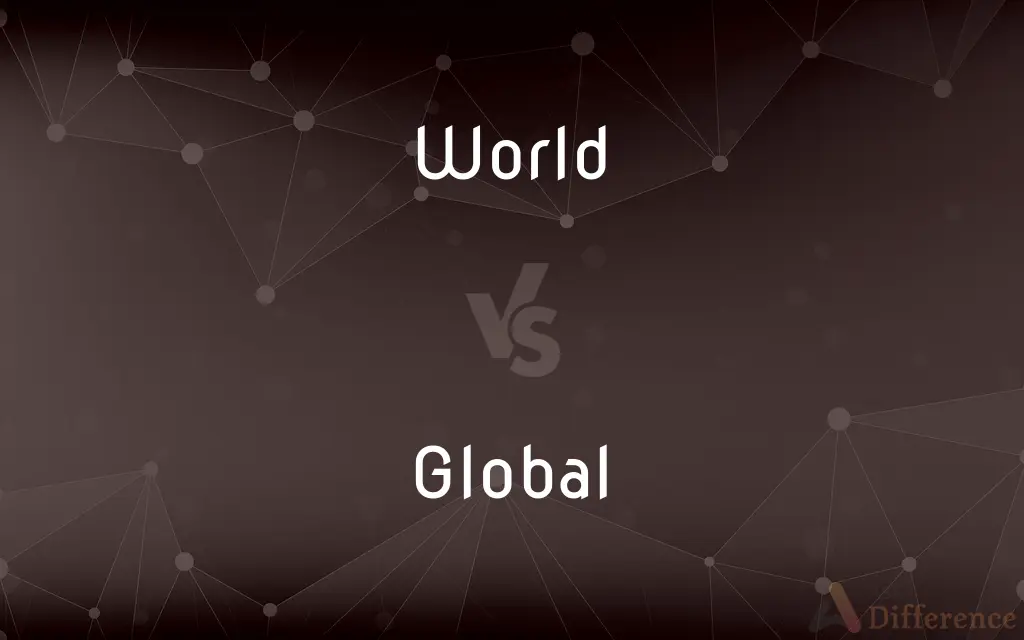World vs. Global — What's the Difference?
Edited by Tayyaba Rehman — By Fiza Rafique — Updated on February 21, 2024
"World" refers to the planet Earth or everything that exists within it, emphasizing a physical or conceptual space, while "global" describes the scope or impact of something, highlighting its worldwide scale or relevance.

Difference Between World and Global
Table of Contents
ADVERTISEMENT
Key Differences
The term "world" can denote the planet Earth, its inhabitants, or the totality of human experience and history. It often pertains to the physical aspects of the planet or to specific realms of human life, such as "the world of art." In contrast, "global" is an adjective that characterizes the extent of phenomena, indicating their worldwide reach or influence, such as in "global economy" or "global warming."
When discussing events or issues, using "world" can suggest a focus on diverse cultures and societies, or the collective human experience, as in "World History." "Global," however, implies an interconnectedness and the crossing of traditional boundaries, emphasizing the comprehensive impact across the globe, like in "global telecommunications network."
In certain contexts, "world" can imply a sense of belonging or a shared identity among humans, as in phrases like "bringing the world together." "Global" tends to be more neutral, used to describe processes, trends, or conditions that span multiple countries and regions, without necessarily implying unity or shared identity, such as "global standards."
The choice between "world" and "global" can also reflect the speaker's perspective or the specific aspect being emphasized. "World" might be used to evoke a more human-centric or cultural nuance, while "global" often points to systemic, environmental, or economic dimensions on a worldwide scale.
Both terms are integral in discussions about international affairs, environmental issues, and cultural exchanges, but their usage can subtly shift the focus from the human aspect and physical existence ("world") to the scale and interconnectedness of phenomena ("global").
ADVERTISEMENT
Comparison Chart
Definition
Refers to the planet Earth or the totality of human existence and experiences.
Describes the scope, impact, or extent of something, emphasizing its worldwide scale.
Usage
Used as a noun to denote a place or the realm of human life.
Used as an adjective to describe phenomena that have a worldwide reach or influence.
Context
Often focuses on the physical planet, human societies, or specific areas of human activity.
Highlights interconnectedness, crossing of boundaries, and comprehensive impact across the globe.
Implication
Can imply a sense of belonging, shared identity, or collective human experience.
Tends to be more neutral, emphasizing the scale and extent of processes or conditions.
Perspective
May evoke a more human-centric or cultural nuance.
Points to systemic, environmental, or economic dimensions on a worldwide scale.
Compare with Definitions
World
"World" refers to the Earth and its life, including human societies.
The documentary explored the diverse wildlife across the world.
Global
Emphasizes worldwide scope or integration.
The rise of the internet has led to a global marketplace.
World
Used to describe global human experiences or events.
World War II involved countries from every part of the world.
Global
Indicates a perspective that considers the entire world.
Global citizenship encourages responsibility towards the planet and its people.
World
Can denote the totality of something in existence.
Advances in technology are changing the business world rapidly.
Global
Pertains to the impact or reach across all countries.
Global health policies aim to improve well-being universally.
World
Refers to a specific realm or field.
In the world of fashion, trends constantly evolve.
Global
Used to discuss comprehensive or interconnected issues.
Global financial systems are increasingly interlinked.
World
Used in expressions to highlight global inclusivity.
The Olympics brings together athletes from around the world.
Global
"Global" describes phenomena or activities that span the entire Earth.
Global initiatives are essential to address climate change.
World
In its most general sense, the term "world" refers to the totality of entities, to the whole of reality or to everything that was, is and will be. The nature of the world has been conceptualized differently in different fields.
Global
Concerning all parts of the world.
Pollution is a global problem.
World
The earth, together with all of its countries and peoples.
It's a wonderful world
He was doing his bit to save the world
Global
Of, relating to, or involving the entire earth; worldwide.
Global war.
Global monetary policies.
World
The 3rd planet from the sun; the planet on which we live.
The Earth moves around the sun
He sailed around the world
Global
In the global manner; world-wide.
World
The earth and its inhabitants, with their concerns; the sum of human affairs and interests.
That forbidden tree, whose mortal tasteBrought death into the world, and all our woe.
Common Curiosities
Does "global" always mean something is present in every part of the world?
Not necessarily. "Global" often means widespread or having a broad impact, but it doesn't imply universal presence in every location.
Can "world" and "global" be used interchangeably?
While related, their usage depends on context. "World" is more about the planet and its cultural or physical aspects, whereas "global" emphasizes an all-encompassing scope or impact.
How does globalization affect the distinction between "world" and "global"?
Globalization blurs the lines by increasing cultural and economic interconnectedness, making "global" aspects more prevalent in various "world" contexts.
How does "world heritage" relate to "global heritage"?
"World heritage" sites are landmarks recognized by UNESCO for their cultural, historical, or scientific significance worldwide, implying they are of outstanding value to humanity. "Global heritage" is a broader term that can include intangible cultural practices and natural phenomena important to the entire planet.
Can a local event be considered a "global" impact?
A local event can have a "global" impact if its effects reach or influence the entire world, such as a local innovation that revolutionizes global industries.
Is "global warming" the same as "world climate change"?
"Global warming" specifically refers to the increase in Earth's average surface temperature, while "world climate change" could be used to discuss the broader range of climate impacts across the globe, though it's less commonly phrased that way.
What is a "world leader" in the context of "global leadership"?
A "world leader" typically refers to a prominent political figure with significant influence on international affairs, whereas "global leadership" encompasses broader qualities or actions that impact the world, not limited to political figures.
Can a company be a "world brand" without being a "global brand"?
A "world brand" may be recognized worldwide for its reputation or quality, but a "global brand" operates on a global scale, with international presence and marketing strategies tailored to various regions.
Can a "world fair" be considered a "global event"?
Yes, a "world fair" can be considered a "global event" as it attracts international participation and attention, showcasing innovations and cultures from around the globe.
Are "world news" and "global news" interchangeable terms?
They're largely interchangeable, both covering significant events worldwide, but "global news" might emphasize stories with wide-reaching implications or international interconnectedness.
How does "worldview" differ from "global perspective"?
A "worldview" is a personal or cultural perspective on life and the universe, while a "global perspective" specifically refers to understanding and considering issues from a worldwide standpoint.
What's the difference between "world economy" and "global market"?
"World economy" refers to the aggregate of all national economies, while "global market" specifically denotes the international trading environment where goods, services, and currencies are exchanged.
Share Your Discovery

Previous Comparison
Pollex vs. Thumb
Next Comparison
Psyche vs. MindAuthor Spotlight
Written by
Fiza RafiqueFiza Rafique is a skilled content writer at AskDifference.com, where she meticulously refines and enhances written pieces. Drawing from her vast editorial expertise, Fiza ensures clarity, accuracy, and precision in every article. Passionate about language, she continually seeks to elevate the quality of content for readers worldwide.
Edited by
Tayyaba RehmanTayyaba Rehman is a distinguished writer, currently serving as a primary contributor to askdifference.com. As a researcher in semantics and etymology, Tayyaba's passion for the complexity of languages and their distinctions has found a perfect home on the platform. Tayyaba delves into the intricacies of language, distinguishing between commonly confused words and phrases, thereby providing clarity for readers worldwide.
















































